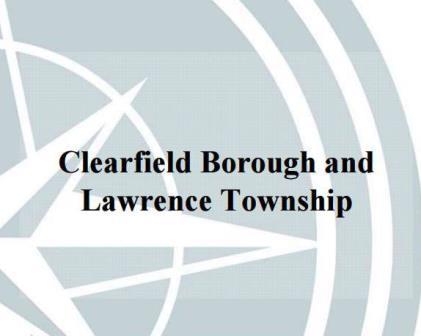CLEARFIELD – Clearfield Borough and Lawrence Township have taken a big step toward consolidating into one municipality.
A public meeting was held Tuesday night at the Clearfield Borough Administration building.
The meeting was held with Joe Boyle, Gerry Cross, Harry Miller and Lynne Shedlock of the Pennsylvania Economy League and a specially-appointed committee consisting of Barbara Shaffner, Jeff Williams, Mark Breakey, Joan Robinson-McMillen, Randy Lemmo, James Moyer, Jim Schell, Joan Shimmel, C. Alan Walker, Terry Struble and Co-chairmen Brian Lytle and Bill Lawhead.
After discussing reports of sub-committees, the group began discussing the actual wording and construction of a Home Rule Charter.
According to the Governor’s Center for Local Government’s Web site, Home Rule transfers the authority to act in municipal affairs from state law, to a local charter, which is adopted and amended by the voters. A county, borough or township choosing Home Rule can tailor its government organization and powers to suit its specific needs.
An elected government study commission would draft the Home Rule Charter, which would act as a local constitution. The charter would be the framework for the local governing body to use to adopt, adapt and administer legislation and regulations for conducting business, expanding citizen participation and the creation of sustainable communities.
However, according to the Governor’s Center, Home Rule has not been fully tested as a tool to revolutionize local, democratic decision-making, but it has the potential to open up a path to community self-governance.
According to the Governor’s Center, Home Rule municipalities are still subject to the restrictions found in the U.S. and Pennsylvania Constitutions. Presently, there are six counties, 19 cities, 19 boroughs and 27 townships operating under Home Rule.
“This is a very monumental thing you’re doing here,” Cross said. “You are essentially drafting your own constitution.”
Cross stressed that the Home Rule Charter, which the committee was presently reviewing was in its very early stages. Tuesday was the first time the committee had met to discuss the actual form and wording of the charter.
Cross emphasized that drafting the charter would be a lengthy process, and the wording will change as the committee continues to work toward the consolidation.
The majority of the discussion centered around what form of government the new municipality would adopt.
If the consolidation is approved, an entirely new group of officials would need to be elected. Cross said the geographical boundaries would be the same as the existing boundaries of Lawrence Township. The landmass would be divided into four districts based on population and one representative would be elected from each district. The council would also be made up of four at-large members and a fifth at-large member would be elected as mayor.
One option would be to adopt a council/manager form of government, similar to what is presently in place in the City of DuBois. Under this form, the manager would act as a chief executive officer and the council would serve as the board of directors. The manager would be appointed by the council and could be removed if the council feels the individual is not performing their duties.
“This would be the second-largest municipality in the state of Pennsylvania,” Robinson-McMillen said. “The manager will need to be a strong individual who would be responsible for making day-to-day decisions.”
The committee discussed what sort of control the manager would have.
“I don’t know if we’d want the manager to have the ability to hire and fire personnel,” Lawhead said. “I think that could lead to favoritism and conflict. I think the council should have the final say.”
Another option would be to have the manager for the day-to-day operations of the new municipality, but the manager would operate under the direction of the council.
“We would have a council of elected officials who are capable of coming together and making policies,” Lytle said. “I think if all that responsibility was put on one person, that person would be on an island.”
The council also discussed having a form of government similar to what is presently in place in the borough, with a council, a manager, and a mayor. If the new municipality were to have a mayor, the charter would need to specify what role the mayor would play. Presently, the mayor of Clearfield oversees the police department, has veto powers and will only vote in the event of a tie among the council members.
The committee did not reach any final decisions at Tuesday’s meeting and will meet again at 6 p.m. March 22 at the Borough Administration Building to continue discussion on the Home Rule Charter.



